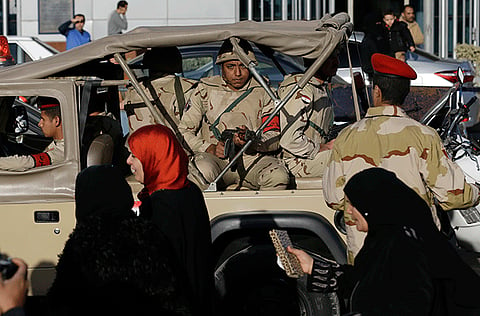At least 40 killed as attacks rock Egypt’s Sinai
Deadly assaults claimed by Egyptian affiliate of Daesh group that has captured chunks of territory in Syria and Iraq

Al Arish, Egypt: The death toll in a string of attacks targeting soldiers and police in Egypt's Sinai Peninsula has climbed to at least 40, a health official said on Friday, prompting President Abdul Fattah Al Sissi to cut short a visit to Ethiopia.
A Daesh extremist group affiliate formerly known as Ansar Beit Al Maqdis claimed responsibility for Thursday's coordinated attacks on military and police facilities in the north of the volatile province.
The dead included security personnel and civilians, Sinai health official Tareq Khater said, adding that at least 36 other people were wounded.
The provincial security headquarters, intelligence buildings and an army officers club as well as a newspaper office and army checkpoints were all hit by mortar fire and car bombs, security officials said.
The militant group, which last year pledged allegiance to the jihadist militia, claimed responsibility for the attacks - the deadliest blow to Egyptian security forces in years.
On a website used by the Daesh for official announcements, the group said it had targeted an army base and a security compound in Al Arish, the capital city of northern Sinai, with three car bombs and "infiltrators."
Related Links
The group, now calling itself the Sinai Province of Daesh, also claimed to have hit eight checkpoints in Al Arish, the town of Rafah on the border with the Palestinian Gaza Strip, and elsewhere in the area.
In October, at least 30 Egyptian soldiers were killed in a series of synchronized attacks in northern Sinai.
Al Sissi's office said on Friday that he had decided to cut short a visit to Ethiopia, where he is attending an African Union summit, and return to Cairo to "follow the situation."
Security forces in the remote desert peninsula bordering Israel and Gaza have come under repeated attack from jihadists since the 2011 uprising that toppled longtime president Hosni Mubarak.
Egyptian army has engaged in a series of campaigns since August 2011 to suppress the jihadists. In recent months, residents have been evacuated to create a kilometre-deep buffer zone along the Gaza border.
Sign up for the Daily Briefing
Get the latest news and updates straight to your inbox



